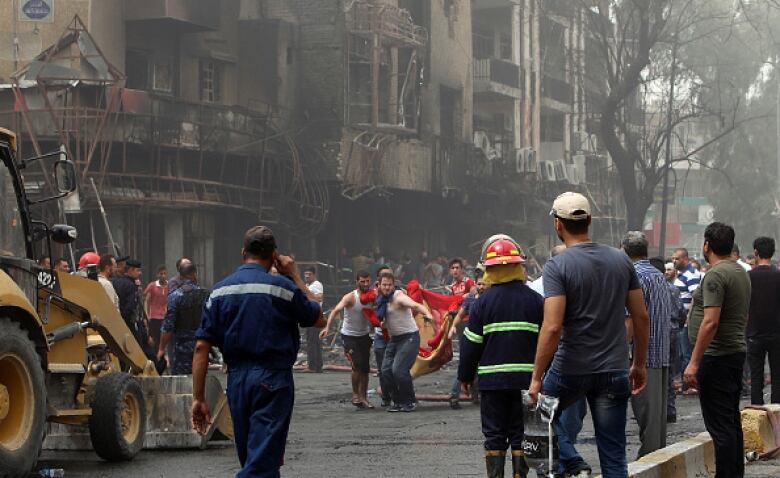Double bombings in Baghdad kill at least 120
ISIS claims responsibility for shopping mall blast that killed 115 people, including 15 children

At least 120 people were killed Sunday in two bombings in the Iraqi capital, including a large-scale attack in a central shopping district claimed by the group Islamic State in Iraq and Syria (ISIS), officials said.
The bombings demonstrated the extremists' ability to mount significant attacks despite major battlefield losses, including the city of Fallujah, which was declared "fully liberated" from ISIS just over a week ago.
The deadliest attack took place in the central Karada district of Baghdad, where a suicide bomber blew up his explosives-laded pickup truck outside a crowded shopping centre, killing at least 115 people and wounding up to 187 others. A police officer said the dead included 15 children, 10 women and six policemen.
The suicide bomber struck shortly after midnight, when families and young people were out on the streets after breaking their daylight fast for the holy month of Ramadan. Most of the victims were inside a multi-storey shopping mall, where dozens burned to death or suffocated, officials said.

"It was like an earthquake," said Karim Sami, a 35-year-old street vendor. "I wrapped up my goods and was heading home when I saw a fire ball with a thunderous bombing. I was so scared to go back and started to make phone calls to my friends, but none answered," the father of three added. He said that one of his friends had been killed, another was wounded and one was still missing.
Within hours, ISIS claimed responsibility for the bombing in a statement posted online, saying they had deliberately targeted Shia Muslims. The Associated Press could not verify the authenticity of the statement, but it was posted on a militant website commonly used by the extremists.

At the scene, firefighters and civilians were seen carrying the dead away, their bodies wrapped in blankets and sheets. Smoke billowed from the shopping center, which was surrounded by the twisted and burned wreckage of cars and market stalls. A group of women were sitting on the pavement, crying for their loved ones.
In the second attack, an improvised explosive device went off in Baghdad's northern Shaab area, killing five people and wounding 16, another police officer said. No group claimed responsibility for the attack, but it bore the hallmarks of ISIS militants who often target commercial districts and Shiite areas.
Medical officials confirmed the casualty figures. All officials spoke anonymously because they were not authorized to release information to the press.

The high death toll made it the deadliest attack in the capital this year. On May 11, ISIS militants carried out three car bombings in Baghdad, killing 93 people.
Hours after the bombing, Iraqi Prime Minister Haider al-Abadi and legislators visited the blast site. Video footage uploaded to social media showed an angry crowd, with people calling al-Abadi a "thief" and shouting at his convoy. Witnesses said the crowd pelted the al-Abadi's car with rocks, shoes and jerry cans.
Until the government launched its Fallujah operation, the prime minister had faced growing social unrest and anti-government protests sparked, in part, by popular anger at the lack of security in the capital. In one month, Baghdad's highly-fortified Green Zone — which houses government buildings and diplomatic missions — was stormed twice by anti-government protesters.
In Karada civilians expressed their frustration at the government's failure to secure the capital.
"We are in a state of war, and these places are targeted. The security can't focus on the war (against ISIS) and forget Baghdad," Sami, the street vendor, said.
ISIS still controls Iraq's second largest city of Mosul as well as significant patches of territory in the country's north and west.
At the height of the extremist group's power in 2014, ISIS rendered nearly a third of the country out of government control. Now, the militants are estimated to control only 14 per cent of Iraqi territory, according to the office of Iraq's prime minister.

Canada condemns 'savage attacks'
Canadian Minister of Foreign Affairs Stéphane Dion issued a statement condemning what he called "savage attacks" on innocent Iraqis.
"Once again, the so-called Islamic State of Iraq and the Levant [ISIL] demonstrates its complete disregard for human life and for Islam, a religion of peace that fosters the respect and promotion of human life," Dion says in the statement.
"These savage attacks occurred during one of the last holy evenings of the month of Ramadan, as people were preparing for Eid. Iraqis of all faiths and backgrounds deserve to live in peace, free from violence and oppression."
"On behalf of the Government of Canada, I offer my sincere condolences to the families and friends of the victims," he adds.
Dion also mentions Canada's commitment to a strategy of fighting ISIS in the region, which was announced by Prime Minister Justin Trudeau on Feb. 8.
Trudeau had called for an end to airstrikes in Iraq and Syria, while beefing up Canada's military efforts, including the number of special and training forces deployed on the ground to train Iraqi forces for the next two years.
Canada's new contributions to fighting ISIS in Iraq will cost more than $1.6 billion over the next three years.
The UN envoy for Iraq, Jan Kubis, described the Karada attack as "a cowardly and heinous act of unparalleled proportions" and urged the Iraqi government to redouble its security efforts to protect Iraqis during the Eid al-Fitr celebrations.
ISIS militants who "have suffered defeats at the battlefront are seeking to avenge their losses by targeting vulnerable civilians," Kubis added.
The White House also condemned the bombings.
"These attacks only strengthen our resolve to support Iraqi security forces as they continue to take back territory from ISIL, just as we continue to intensify our efforts to root out ISIL's terrorist network and leaders," National Security Council spokesman Ned Price said in a statement, referring to IS by an alternative acronym.
